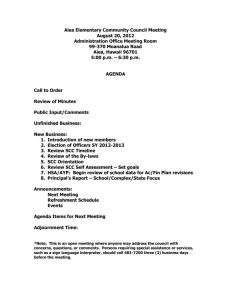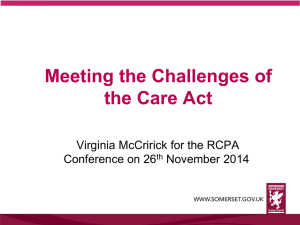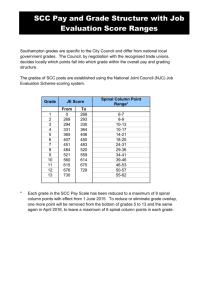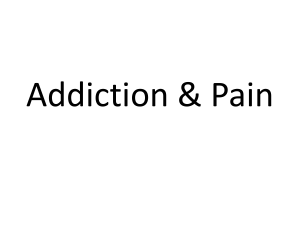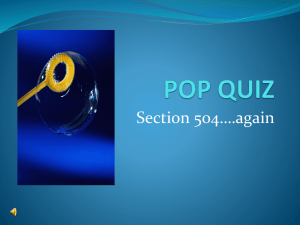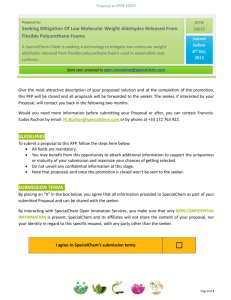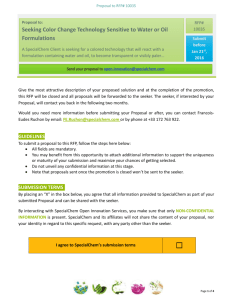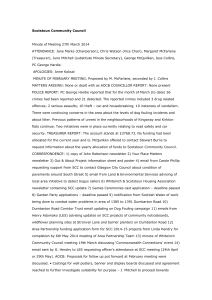Special Class Clients Guidelines
advertisement
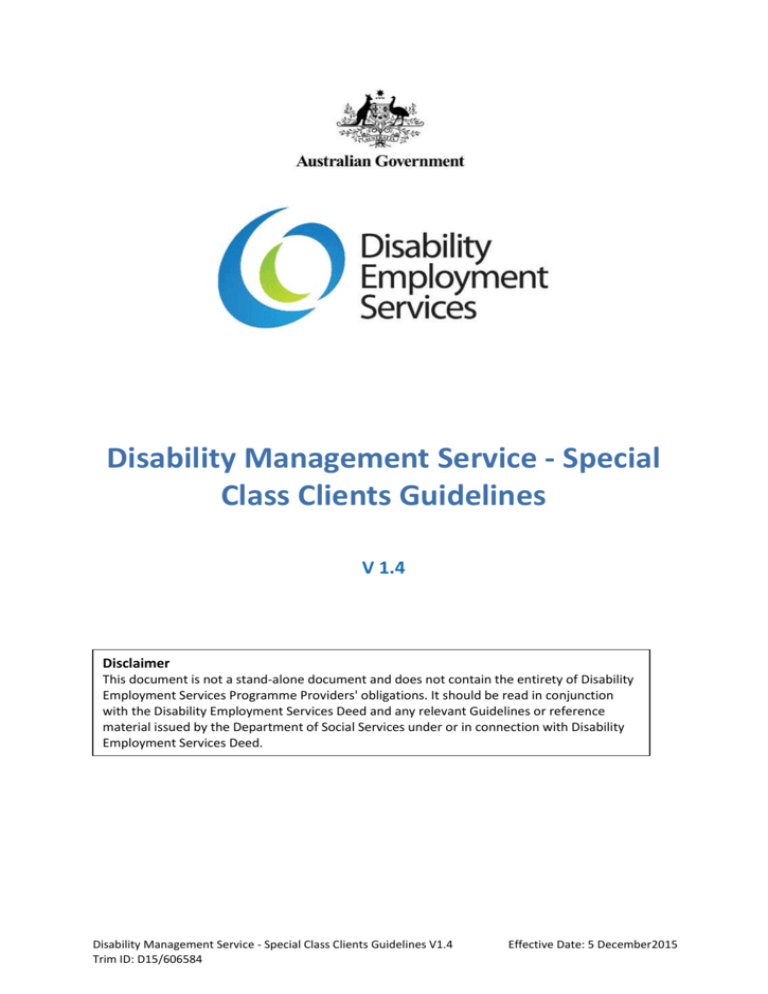
Disability Management Service - Special Class Clients Guidelines V 1.4 Disclaimer This document is not a stand-alone document and does not contain the entirety of Disability Employment Services Programme Providers' obligations. It should be read in conjunction with the Disability Employment Services Deed and any relevant Guidelines or reference material issued by the Department of Social Services under or in connection with Disability Employment Services Deed. Disability Management Service - Special Class Clients Guidelines V1.4 Trim ID: D15/606584 Effective Date: 5 December2015 Table of Contents Disability Management Service - Special Class Clients Guidelines ............................................ 3 Document Change History 3 Overview 3 Text Version of Flow Chart: Special Class Clients 6 Disability Employment Services Deed 2010-2012 Clauses 7 Reference documents relevant to these guidelines 7 Explanatory Notes 7 Special Class Clients Guidelines ................................................................................................. 8 Disability Management Service - Special Class Clients Guidelines V1.4 Trim ID: D15/606584 2 Effective Date: 5 December 2015 Disability Management Service - Special Class Clients Guidelines Document Change History Version Start Date Effective Date End Date Change & Location 1.4 5 December 2015 5 December 2015 1.3 12 September 2015 12 September 2015 4 December 2015 1.2 8 Dec 2014 8 Dec 2014 11 September 2015 Narrative: Document has been updated to clarify the intent of SCC eligibility policy in DES and to clearly set out Documentary Evidence requirements for the Direct Registration and Commencement of SCC eligible Participants in DES-DMS. 1.1 12 Aug 2011 12 Aug 2011 7 Dec 2014 Narrative: References to Job Capacity Assessments/Employment Services Assessments modified throughout to reflect terminology changes, p 3-8. 1.0 15 Jan 2010 01 Mar 2010 12 Aug 2011 Original version of document Update to terminology. Inclusion of information about requesting ESAt/JCA exempt flags to be added to job seeker records. Step 3, p10. Update to terminology Overview Special Class Client (SCC) eligibility enables job seekers who have acquired a disability, injury or illness as a result of being present at, and directly affected by, extreme events such as natural disasters and acts of terrorism, to access Disability Employment Services (DES) Disability Management Service (DES-DMS) without undertaking an Employment Services Assessment (ESAt) of Job Capacity Assessment (JCA). Job seekers who access DES-DMS under SCC eligibility arrangements are not required to be in receipt of qualifying Centrelink payments and are not subject to the DES Non-beneficiary Income Test. SCC extreme events are generally declared by the Australian Government through the Department of Social Services (DSS). DSS will notify DES-DMS Providers of changes to the SCC declared extreme event categories through the Provider Portal and updates to the SCC Guidelines. The following declared extreme event categories are currently in place for SCC eligibility purposes: Bali bombings December 2004 Tsunami Disability Management Service - Special Class Clients Guidelines V1.4 Trim ID: D15/606584 3 Effective Date: 5 December 2015 London bombings These Guidelines outline the steps to be taken by DES–DMS Providers to identify job seekers who are eligible to be Registered and Commenced under SCC eligibility arrangements. Disability Management Service - Special Class Clients Guidelines V1.4 Trim ID: D15/606584 4 Effective Date: 5 December 2015 Disability Management Service - Special Class Clients Guidelines V1.4 Trim ID: D15/606584 5 Effective Date: 5 December 2015 Text Version of Flow Chart: Special Class Clients Step Action 1. DES-DMS Provider identifies potential SCC eligible job seeker during the Direct Registration process. DES-DMS Provider determines job seeker’s eligibility as a SCC - Yes or No. 2. 3. 4. If Yes, the DES-DMS Provider Directly Registers the job seeker. If No, the DES-DMS Provider should determine whether the job seeker is eligible for other Programme Services. Note: This should not be read as a stand-alone document, please refer to the Disability Employment Services Deed. Disability Management Service - Special Class Clients Guidelines V1.4 Trim ID: D15/606584 6 Effective Date: 5 December 2015 Disability Employment Services Deed 2010-2012 Clauses Clause 83 – Direct Registration of Participants without a referral Clause 88 – Initial Contacts Annexure A – Definitions Reference documents relevant to these guidelines Direct Registration Guidelines Eligibility, Referral and Commencement Guidelines Documentary Evidence for Claims for Payment Guidelines Disability Management Service Not Receiving Income Support Guidelines Explanatory Notes 1. All capitalised terms have the same meaning as in the Disability Employment Services Deed. 2. In this document, “must” means that compliance is mandatory and “should” means that compliance represents best practice. 3. Italicised text is a hyperlink to the relevant reference material. Disability Management Service - Special Class Clients Guidelines V1.4 Trim ID: D15/606584 7 Effective Date: 5 December 2015 Special Class Clients Guidelines Who is Responsible: 1. Job Seeker Job Seeker approaches a DESDMS Provider. The DES-DMS Provider identifies the potential SCC during the Direct Registration process 2. The DES-DMS Provider Determine the job seeker’s eligibility to be Registered and Commenced in DES-DMS as a SCC What is Required: A SCC may present directly to a DES-DMS Provider without a referral from the Department of Human Services (Human Services). SCCs do not require an ESAt or JCA to determine eligibility for DES-DMS and are not subject to the DES Nonbeneficiaries Income Test (refer to Disability Management Service Not Receiving Income Support Guidelines for more information). Eligibility To be eligible for DES-DMS as a SCC, the job seeker must meet the general eligibility criteria set out in Step 2, Page 9 of the DES Direct Registration Guidelines. In addition, the job seeker must have a disability, injury or health condition as result of being present at and directly affected by one of the following declared extreme events: Bali Bombings Tsunami in December 2004 London Bombings The job seeker must also meet all other requirements set out in any DES guidelines and the DES Deed. Documentary Evidence Job seekers who are Registered and Commenced in DESDMS as SCCs must be eligible for DES-DMS at the time of Registration and Commencement. This means that a DESDMS Provider must ensure they have obtained the necessary Documentary Evidence (as outlined below) prior to Registering and Commencing the job seeker in DES– DMS. The Documentary Evidence that must be obtained by the DES-DMS Provider falls into three categories: 1. Documentary Evidence to support Direct Registration A DES Direct Registration Form (DRF) which has been completed in accordance with the DES Direct Registration Guidelines and retained on file. 2. Documentary Evidence to support the job seeker’s SCC eligibility Medical evidence verifying the job seeker has a disability, injury or illness. This could include a medical certificate issued by a General Practitioner Disability Management Service - Special Class Clients Guidelines V1.4 Trim ID: D15/606584 8 Effective Date: 5 December 2015 Who is Responsible: What is Required: or other relevant medical record. Statutory Declaration from the Participant stating they were present at one of the declared extreme events. Note: The department may seek to confirm that a SCC Participant was present at the declared extreme event as part of its ongoing programme assurance process. 3. Documentary Evidence to demonstrate a job seeker’s capacity to work a minimum of eight hours per week. As a general principle, all job seekers accessing DESDMS must have the capacity to work at their minimum Employment Benchmark hours. The Employment Benchmark is important as it not only determines a job seeker’s capacity to participate in and benefit from DES-DMS, but it also identifies the job seeker’s limitations to the amount of work they can do. A job seeker’s Employment Benchmark is normally determined by an ESAt or JCA. SCC Participants have a default Employment Benchmark of eight hour per week as they are not required to undertake an ESAt/JCA. In the absence of an ESAt/JCA and prior to Registering and Commencing a SCC ,the DES-DMS Provider must determine the job seeker has a capacity to work a minimum of eight hours per week*. *This requirement is included in the DES Direct Registration Form under the ‘Declaration by DES Provider’. This evidence must be maintained on the Participant’s file in accordance with the Documentary Evidence for Claims for Payment Guidelines. If the job seeker is eligible as a SCC, they should be immediately Directly Registered and Commenced. 3. The DES-DMS Provider Directly Register and If the job seeker is not eligible to be Registered and Commenced as a SCC Proceed to Step 4. After confirming the job seeker’s eligibility as a SCC the DES-DMS Provider must immediately Directly Register the job seeker, conduct an Initial Interview and Commence Disability Management Service - Special Class Clients Guidelines V1.4 Trim ID: D15/606584 9 Effective Date: 5 December 2015 Who is Responsible: What is Required: Commence the job seeker as a them in accordance with the Direct Registration Guidelines SCC. and Eligibility, Referral and Commencement Guidelines To Register and Commence a job seeker as a SCC, a DESDMS Provider should first check the Department’s IT system to determine whether the job seeker has an existing Registration record. If an existing record cannot be found a DES-DMS Provider must enter the Registration information into the Department’s IT system and apply the SCC flag to Commence the job seeker. The application of the flag will allow the job seeker to be Commenced in DESDMS without having an ESAt or JCA result recorded in the system and will automatically allocate an eight hour Employment Benchmark. Note: The SCC ESAt/JCA Exempt flag must be entered at the time that the job seeker is being Commenced in DES. Failure to do so will prevent the system from allowing the job seeker to be Commenced. When this occurs a DES Provider should contact their Contract Manager and provide Documentary Evidence confirming the job seeker’s SCC eligibility. Once the Contract Manager has received this evidence they will advise the Helpdesk to add the flag if appropriate. Refer to the Requesting Employment Services Assessment/Job Capacity Assessment (ESAt/JCA) Exempt Flags to be Added or Removed from Job Seeker Records Job Aid Note: All Directly Registered Participants must have a CRN. Please refer to the DES Direct Registration Guidelines Step 6, P13 for more information. The SCC ESAt/JCA exempt flag can be found on the ‘Circumstances’ pane of the Registration screen. To apply a flag, a DES-DMS Provider selects the appropriate ‘ESAt/JCA exempt’ flag. End of Process Disability Management Service - Special Class Clients Guidelines V1.4 Trim ID: D15/606584 10 Effective Date: 5 December 2015
